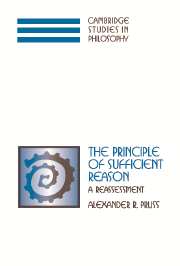Book contents
- Frontmatter
- Contents
- Acknowledgments
- Part I The Principle of Sufficient Reason and the Causal Principle
- Part II Objections to the PSR
- Part III Justifications of the PSR
- 11 Self-Evidence
- 12 Three Thomistic Arguments
- 13 Modal Arguments
- 14 Is the Universe Reasonable?
- 15 Explanation of Negative States of Affairs
- 16 The Puzzle of the Everyday Applicability of the PSR
- 17 Inference to the Best or Only Explanation
- 18 Inductive Skepticism
- 19 The Nature of Possibility
- 20 Conclusions
- Bibliography
- Index
20 - Conclusions
Published online by Cambridge University Press: 27 July 2009
- Frontmatter
- Contents
- Acknowledgments
- Part I The Principle of Sufficient Reason and the Causal Principle
- Part II Objections to the PSR
- Part III Justifications of the PSR
- 11 Self-Evidence
- 12 Three Thomistic Arguments
- 13 Modal Arguments
- 14 Is the Universe Reasonable?
- 15 Explanation of Negative States of Affairs
- 16 The Puzzle of the Everyday Applicability of the PSR
- 17 Inference to the Best or Only Explanation
- 18 Inductive Skepticism
- 19 The Nature of Possibility
- 20 Conclusions
- Bibliography
- Index
Summary
In Part I, I argued that plausibly most of the versions of the PSR and the Causal Principle stand and fall together intuitively. Then, in Part II, I argued for the failure of the objections against a PSR that states that every contingent proposition has an explanation. These arguments require that explanation be understood in such a way that the explanans not be required to entail the explanandum or else in such a way that contingent self-explanatory propositions be possible. The guiding intuition here was to follow our ordinary usage of explains, as well as a grander notion that to explain is to remove mystery. The self-explanatory is what is not mysterious once you grasp it. This means that as long as we are willing to admit that there is no mystery left about the choice when we say that a libertarian-free agent freely chose A for R, we can coherently say that the proposition reporting this choice is self-explanatory, modulo the need to explain why the agent existed, found herself free under the circumstances, and saw R as a reason.
It may be objected that the notion of explanation is not a very strong one. It certainly is not strong enough to satisfy the entailment requirement, but then again few explanations we give in everyday life are. However, the notion of explanation and the associated PSR are sufficiently strong to allow us to require answers to global questions, such as why there is a contingent being or why the Big Conjunctive Contingent Fact is true.
- Type
- Chapter
- Information
- The Principle of Sufficient ReasonA Reassessment, pp. 321 - 322Publisher: Cambridge University PressPrint publication year: 2006



